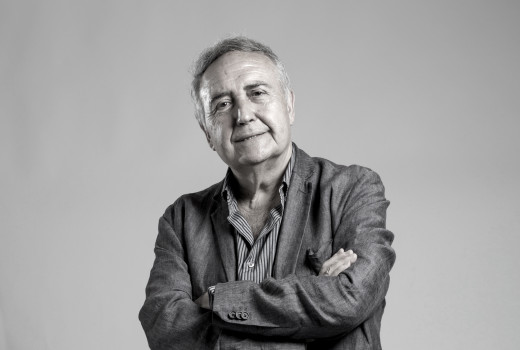The Young Man without Soul. A Romantic Novel
Original title: El joven sin alma
El joven sin alma. Novela romántica is the story of a sexual and artistic sentimental education, and of a search for identity with the backdrop of Spain–and Europe– in the 50s and 60s, when the ghosts of the Spanish Civil War still lingered. The story is located in the most important cities of the protagonist’s journey of discovery: Alicante, Madrid, Barcelona, Paris, Lisbon, where he spends his childhood, adolescence and first experiences as an adult.
Experiences like a first crush on his nanny, a meeting with Camilo José Cela, who signs books for the aspiring author, as well as giving him his first lessons and advice, the first books he reads and the later ones that mixed Marxism and surrealism and a passion for cinema. And these pages contain a lot of cinema –by Naná and Godard, Hitchcock and his heroines, the Mabuses by Fritz Lang–, not just descriptions of great or «alien» films, but also of movie houses where the protagonist has some decisive experiences. And through his relationship with film and the legendary magazine Film Ideal, he forms some important relationships: with Ramón –who invites him to Barcelona and introduces him to his sister Ana María who initiates him into the world of sexuality– and with a group of young poets: Pedro, Guillermo, Leopoldo... with whom he forges a fervent friendship of crossed and often unrequited love and a shared vision of the transcendental nature of art. They form a group which tries to bring a romantic novel to life in their neurotic and exasperated way, as impertinent as they are naive, embracing new beliefs and a militancy across the different fronts being fought at the time.
El joven sin alma. Novela romántica is the story of a sexual and artistic sentimental education, and of a search for identity with the backdrop of Spain–and Europe– in the 50s and 60s, when the ghosts of the Spanish Civil War still lingered. The story is located in the most important cities of the protagonist’s journey of discovery: Alicante, Madrid, Barcelona, Paris, Lisbon, where he spends his childhood, adolescence and first experiences as an adult.
Experiences like a first crush on his nanny, a meeting with Camilo José Cela, who signs books for the aspiring author, as well as giving him his first lessons and advice, the first books he reads and the later ones that mixed Marxism and surrealism and a passion for cinema. And these pages contain a lot of cinema –by Naná and Godard, Hitchcock and his heroines, the Mabuses by Fritz Lang–, not just descriptions of great or «alien» films, but also of movie houses where the protagonist has some decisive experiences. And through his relationship with film and the legendary magazine Film Ideal, he forms some important relationships: with Ramón –who invites him to Barcelona and introduces him to his sister Ana María who initiates him into the world of sexuality– and with a group of young poets: Pedro, Guillermo, Leopoldo... with whom he forges a fervent friendship of crossed and often unrequited love and a shared vision of the transcendental nature of art. They form a group which tries to bring a romantic novel to life in their neurotic and exasperated way, as impertinent as they are naive, embracing new beliefs and a militancy across the different fronts being fought at the time.
